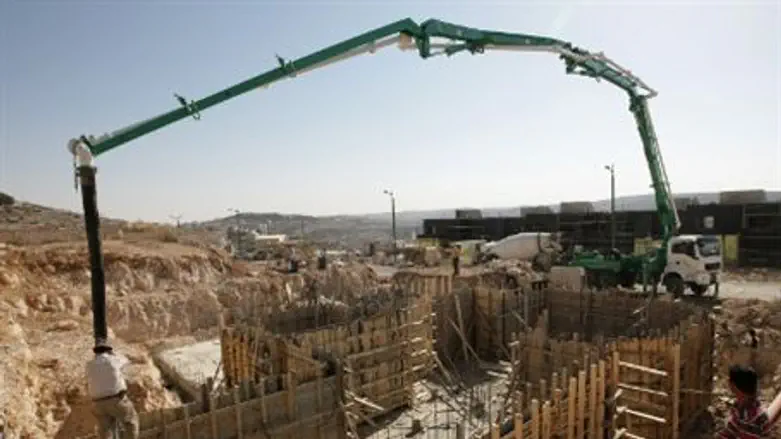
The Palestinian Authority (PA) said Sunday that the tenders for over 1,000 homes in Jerusalem, Judea and Samaria were proof that Israel "was not serious in the negotiations" with the PA.
PA negotiator Mohammed Shtayeh said in a statement that Israel "aims through this condensed settlement activity to destroy the basis of the solution called for by the international community, which aims to establish a Palestinian state on the 1967 borders [sic]."
In response to criticism of the decision to build in Judea and Samaria, Housing Minister Uri Ariel (Bayit Yehudi) responded:
"No country in the world accepts dictates from other countries on where it is allowed to build or not," adding that "We shall continue to market apartments and build throughout the country."
Jerusalem Mayor Nir Barkat, meanwhile, expressed his pleasure with the Construction and Housing Ministry's decision to build about 800 of the new homes in Jerusalem.
“New construction in the capital is essential for the city's development and strength,” he said. “I am happy that the government of Israel sees this important need eye to eye with us.”
Politicians from the center and left of the political spectrum were not as happy as Barkat.
"The publishing of tenders for the marketing of 1,200 housing units in eastern Jerusalem and in the large settlement blocs at this time, is a double mistake,” Finance Minister Yair Lapid said after the announcement by the Construction and Housing Ministry.
"Solutions to the housing problem should be implemented in the areas of demand,” Lapid said. “In addition, the use of resources that are intended for housing for the middle class, in order to make an unnecessary gesture of defiance vis-a-vis the Americans and to throw a spanner in the works of the peace talks, is mistaken and does not help the process.”
However, Lapid's statements concerning demand for housing in Judea and Samaria were belied by a report issued by the Population Bureau just last week. The report showed that Israel's population as a whole rose by 1.9% on average for the first six months of 2013 – but the population in Judea and Samaria climbed 2.12%, an above-average increase due both to the higher birth rate among Jews in the region, as well as a high demand for housing in the region.
The greatest population growth took place in the South Hevron Hills area, where population growth during the period was nearly 5%, most of it due to Israelis moving to the area in droves. In several communities, including Nahliel in the Biyamin region and in several towns in the Jordan Valley, population growth exceeded 10% for the period. In Har Gilo, south of Jerusalem, the population grew 21% during that time.
Labor party leader MK Shelly Yechimovich called the decision on construction “a finger in the eye” of the U.S., Europe, the PA and “the overwhelming majority of Israeli citizens who desire peace.”
"Even though the announcement has no practical meaning,” she added, “it violently torpedoes the budding international recognition and support that we are receiving thanks to the ignition of the negotiations.”
Despite PA accusations against Israel regarding the "peace process,” the PA itself continues to incite against Israel in official media.
Prime Minister Binyamin Netanyahu sent a letter Saturday evening to U.S. Secretary of State John Kerry in which he complained that Palestinian Authority (PA) incitement against Israel is continuing even after the return to U.S.-brokered “peace negotiations” between Israel and the PA was announced.
"Incitement and peace do not go together,” wrote Netanyahu. “Instead of educating the next generation of Palestinians to live in peace with Israel, the education to terror poisons them against Israel and lays the groundwork for continued violence and terror.”
In the most recent such incident, PA TV broadcast a crudely anti-Semitic program legitimizing violence against Jews in Judea and Samaria – who were stereotyped as violent thieves. The end of the program glorified the humiliation of a religious Jew by cutting off his peyot (side-curls), in a scene chillingly reminiscent of Nazi anti-Jewish propaganda.